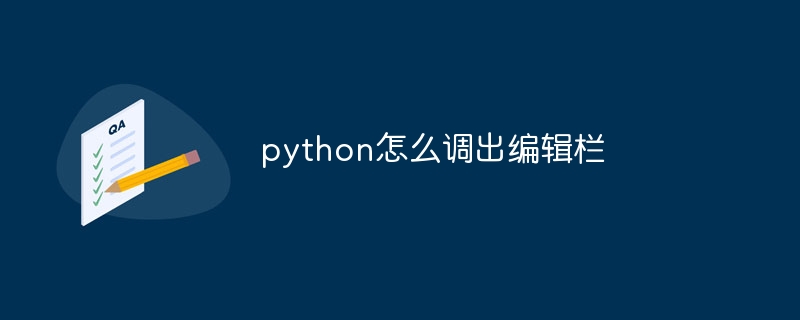Home >Backend Development >Python Tutorial >How to bring up the edit bar in python
How to bring up the edit bar in python
- 下次还敢Original
- 2024-05-05 20:09:58869browse
In the Python interactive interpreter, you can use the following method to bring up the edit bar: use the open() function to create a file and open it in the editor. Using a Python IDE such as PyCharm or VSCode, bring up the edit bar via "File" > "New" > "Python File". Use the python filename.py -m <editor> command on the command line, where <editor> is the name of the editor. Use the edit() function in the interactive interpreter to save the code to a file, and then open it in the editor

How to call in Python Exit the edit bar
In the Python interactive interpreter, you can bring up the edit bar through the following methods:
1. Use the open() function
open('filename.py', 'w') The command will create a file named filename.py in the current directory, or overwrite its contents if the file already exists. You can then open the file in an editor and start editing.
2. Using Python IDE
If you use a Python IDE (integrated development environment), such as PyCharm or VSCode, you can bring up the edit bar in the following ways:
- In PyCharm, click "File" > "New" > "Python File".
- In VSCode, click "File" > "New" > "Python File", or press the keyboard shortcut "Ctrl" "N".
3. Using the command line
If you are using Python from the command line, you can use the following command to open the editor:
python filename.py -m <editor>
where <editor> is the name of the editor you want to use, for example:
-
gedit: GNOME editor -
vi: Vim editor -
nano: Nano editor
4. Use the edit() function in the interactive interpreter**:
In the Python interactive interpreter, you can use ## The #edit() function saves the code in the current session to a file and then opens the file for editing in the editor.
Code example:
<code class="python">edit("test.py")</code>
Note: The above method only applies to saving Python code to a local file. If you want to edit code in the interactive interpreter, you need to use Python IDLE.
The above is the detailed content of How to bring up the edit bar in python. For more information, please follow other related articles on the PHP Chinese website!

